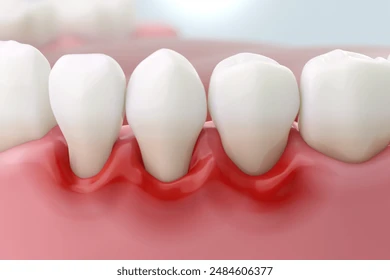
Periodontal Treatments in Highpoint: Restoring Gum Health & Saving Smiles
Gum disease (periodontal disease) is more common than many realize—but its effects can be serious if left untreated. At Gentle Care Family Dental, we believe in not just treating symptoms, but restoring gum health, preventing tooth loss, and helping you keep a confident smile for life. If you’ve noticed bleeding gums, swelling, or gums pulling away from teeth, or even bad breath that won’t go away, you may be experiencing periodontal problems. Here’s what you need to know about periodontal treatments available in Highpoint, what they involve, and how to protect your oral health.
What is Periodontal Disease?
Periodontal disease is an infection of the gums and supporting structures (gum tissue, ligaments, and jaw bone) around your teeth. It often begins as gingivitis, marked by redness, swelling, and bleeding, especially when brushing or flossing. If gingivitis isn’t addressed, it can progress to periodontitis, where the infection spreads beneath the gumline, creating pockets, damaging bone, and adding risk to tooth stability.
Several factors contribute to its development: plaque buildup, poor oral hygiene, smoking or tobacco use, genetic predisposition, some medical conditions (like diabetes), certain medications, and even hormonal changes. Early signs often include bleeding gums, bad breath, or mild sensitivity. More advanced disease shows as receding gums, deep gum pockets, loose teeth, or changes in the way your teeth fit together.
Why Treatment Matters
Left untreated, periodontal disease can lead to irreversible damage. Bone loss around teeth may occur, gums may recede, the risk of tooth loss increases—and as research shows, poor gum health can have implications beyond the mouth, potentially affecting cardiovascular health, diabetes, and more. Treating gum disease early often means simpler, less invasive care. Once disease advances, more complex surgical interventions become necessary. Timely treatment can save you discomfort, expense, and preserve your natural teeth.
Periodontal Treatment Options in Highpoint
At Gentle Care Family Dental, we tailor treatment based on the severity of disease, your overall health, and your goals. Below are common treatments provided, rising in invasiveness depending on how long disease has progressed.
- Non-Surgical Therapy (Deep Cleaning / Scaling & Root Planing)
The first line of defense. This involves removing plaque and tartar from above and below the gumline (scaling), followed by smoothing rough spots on roots (root planing) to discourage bacteria accumulation and help gums reattach. Local anesthesia may be used for comfort. After care includes good oral hygiene and possibly antibiotics when needed. - Antibacterial or Antimicrobial Therapy
In conjunction with cleaning, medications (topical or systemic) may be used to reduce bacterial load. This might include medicated mouth rinses, gels applied under gums, or oral antibiotics. These support healing and help prevent reinfection. - Maintenance Therapy
Once initial treatment is successful, regular checkups and cleanings—often every 3–4 months instead of the usual 6—help keep disease from recurring. Maintenance also includes monitoring pocket depths, gum attachment levels, and ensuring your home care (brushing, flossing) remains effective. - Surgical Treatments
If non-surgical methods are not sufficient—say, due to deep pockets, significant bone loss, or tissue damage—surgery may be needed. Some common surgical options include:- Pocket reduction (flap surgery): lifting the gums to clean infected tissue deeply, then placing gum tissue back to reduce pocket depth.
- Bone grafts and regeneration: when bone supporting teeth has been lost, graft material or regenerative proteins are used to stimulate new bone.
- Soft tissue grafts: for recession of gums, grafting tissue (often from your palate or donor sources) to cover roots, protect them, and restore a more natural gum line.
- Laser Periodontal Therapy (if offered)
Some practices in Highpoint may use lasers to reduce bacteria in periodontal pockets, remove diseased tissue, and promote healing with less discomfort and potentially faster recovery. If Gentle Care offers this option, it can be a valuable, less invasive alternative to traditional surgical tools.
What to Expect During Treatment
- Evaluation and Diagnosis: Initial exam includes measuring pocket depths, checking gum attachment and recession, x-rays to assess bone levels, evaluating risk factors (e.g. smoking, systemic health).
- Comfort and Safety: Local anesthesia is used for deeper cleanings or surgery. Tools and techniques are chosen to minimize discomfort.
- Healing Phase: Following treatment, some soreness or bleeding is expected. You may be given instructions for gentle cleaning, special rinses, or dietary modifications.
- Follow-Ups: Multiple visits may be needed—both for completing treatment and for monitoring healing and preventing recurrence.
How You Can Help Prevent Periodontal Disease
Prevention is always better than cure. Here are steps you can take:
- Brush teeth at least twice daily with a fluoride toothpaste.
- Floss daily to remove plaque from between teeth and under the gumline.
- Use antimicrobial mouth rinses if recommended.
- Avoid tobacco in all forms.
- Eat a balanced diet and limit sugary foods/drinks.
- Stay on top of professional cleanings and exams.
- Manage systemic health issues (diabetes, immune health) which can influence gum health.
Why Choose Gentle Care Family Dental in Highpoint
At Gentle Care, our approach combines experienced clinicians, modern diagnostic tools, and individualized treatment planning. We understand that every patient is different—what works for one may not work for another. We focus not just on treating disease, but restoring your comfort, confidence, and long-term oral health. Your smile deserves gentle care that lasts.


